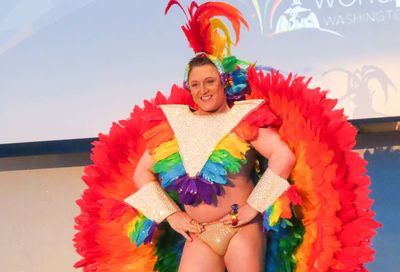Earth Day 2020: Amid COVID-19, the fight for our future goes digital
On the eve of Earth Day 50, Greenpeace USA finds itself more than ever laser-focused on tackling climate change

“All the environmental movement wants is to take care of our planet and to make sure we have a livable planet for future generations,” says Crystal Mojica, a senior communications specialist at Greenpeace USA. “We just want to make sure that our kids and people who are currently inhabiting this planet can take care of it so that subsequently people can live in it in the future and that we fight to maintain it.”
Mojica’s rhetoric strikes the right chord with most people, yet critics often cast Greenpeace’s headline-grabbing stunts — intended to call attention to specific issues — as dangerous or “extreme.” Among the demonstrations undertaken by the organization include activists who rappelled from a bridge in Portland, Ore., in 2015 to block a Shell Oil icebreaker that was being used to drill for oil in Arctic waters.
That same year, Greenpeace led a successful campaign against Procter & Gamble over its relationships with companies that were harvesting palm oil in an unsustainable manner — a process that was leading to mass deforestation in Indonesia and disrupting the natural habitats of the animals there. In that protest, a demonstrator in a tiger suit suspended themselves on a high wire in between two banners that were unfurled along the front of buildings at the company’s corporate headquarters in Cincinnati.
Greenpeace has also held “die-ins” to protest the danger of nuclear weapons, held marches and demonstrations to attempt to block the Dakota Access Pipeline from being built — leading to several arrests — and protested companies that engage in hydraulic fracturing, or fracking, which critics say has led to contaminated water in areas where it’s practiced.
“Our mission is to bear witness to environmental destruction in a nonviolent and peaceful manner,” says Mojica. “We want to strike the debate amongst people and be very confrontational and be out there in the public letting people know that we can not sit idly by while injustice is taking place.”
Mojica acknowledges that the organization’s tactics can be misconstrued, but says the current environmental situation favors bold action “to put those conversations at the forefront and in the public eye” in order to pressure major corporations and the government to take action or curb unsustainable practices.
But the primary reason Mojica is undeterred by criticism is a rapidly-approaching deadline: by 2030, if countries around the world do not drastically curb their use of fossil fuels and the carbon emissions that result from it, the damage to the planet due the effects of climate change will be irreversible.
“According to the Intergovernmental Panel on Climate Change report, we have 10 years to get our act together, basically,” she says. “I trust the science and I trust that these scientists are researching and documenting this in an objective manner that is truly looking out for the wellbeing and the welfare of humanity. We’ve already seen a higher frequency of hurricanes. We’ve seen poor air quality and poor water quality. And we’ve seen how people of color, and that includes LGBTQ-identifying people, are going to be disproportionately affected.”

It’s why Greenpeace is urging those who care about the environment to support Earth Day, an annual event designed to celebrate and push for environmental protection. Greenpeace is hosting three days of Earth Day events, from April 22 to 24, in a new digital format due to the ongoing COVID-19 pandemic. “Earth Day Live,” in partnership with the Climate Strike Coalition, will feature live webinars and virtual organizing centered around climate justice, as well as serve as a call-to-action for every level of society to work to reverse climate change.
This year marks the 50th anniversary of Earth Day, and Lisa Ramsden, a senior action campaigner at Greenpeace USA, says that while there is still much to do, the environmental movement has enjoyed a number of significant victories since the first Earth Day celebration in 1970.
“We’ve banned toxic pesticides such as DDT,” she says. “We’ve gotten Congress to pass the Clean Water Act. We’ve created the Endangered Species Act. We have banned commercial whaling worldwide. And so much more.”
Ramsden laments that, in some circles, Earth Day has begun to be viewed as a partisan affair, with conservatives and Republicans being most skeptical of climate science.
“A healthy environment is essential for everyone to live on this Earth. Not just liberal folks or radical folks, but for the conservative folks, too,” she says. “Any claim that the environmental movement is too radical or violent or anything like that, I feel like, more often than not, these claims are coming from people who are backed by the pollution industry, like the big oil companies who see the environmental movement as a threat to their bottom line.”
While Greenpeace’s activism can be controversial, Ramsden says that some people deliberately try to conflate its protests with more violent actions done by other groups, such as ramming whaling ships. But she insists that the organization only espouses peaceful protests, and always has.
From Ramsden’s perspective, there are all too many pressing environmental issues to deal with, which means there’s little time to waste — or to apologize because some people or corporations might be offended by Greenpeace’s tactics.
“We do sometimes take things to the next level, but we feel like we have to kind of be a bit more radical in these times because there are so many threats with the environment, and it would be irresponsible not to act,” she says. “Climate change is obviously the biggest threat, in my opinion. It affects everything from the air that we breathe to the oceans to the Arctic and Antarctic. But our oceans are also in a very bad state right now. They’re being overfished, they’re warming because of climate change, coral reefs are bleaching, and all of the throwaway plastic that we are producing is eventually winding up in the oceans as well. Our world’s forests are seemingly constantly on fire these days, so that’s also quite a big problem, which is also most likely exacerbated by climate change.”
Both Ramsden and Mojica say that the ongoing COVID-19 pandemic has highlighted the degree to which humans typically contribute to climate change and pollution when they’re not socially distancing or staying home.
“We’re definitely seeing a drop in carbon emissions considering the stay-at-home orders that we have in place globally,” says Mojica. “That’s because people are not taking planes or not driving as often, and so we have seen a drop. But unfortunately that, on its own, is not going to combat the climate crisis.”
“We can’t just look at the COVID-19 crisis and think that we’re giving our planet a moment to breathe, and that we can just go back to business as normal,” adds Ramsden. “I think we really need systemic change to actually tackle the climate emergency. We need to invest in a ‘just transition’ away from fossil fuel dependency. We have to change our agricultural practices. We have to radically redesign our cities.”

To accomplish those aims, politicians should embrace the Green New Deal, which Ramsden calls an “ambitious but also realistic goal.”
“What’s great about the Green New Deal is that it doesn’t leave workers behind. It calls for a just transition, so that means that everyone who is working in a polluting sector, like a coal mine or an oil refinery, can be retrained so they can get jobs in the clean energy sector. It’s also great because it could create lots of jobs working in renewable energies, and that’s going to become increasingly more important as we continue to have unemployment skyrocket from the COVID crisis.”
When the first Democratic primary candidates began their campaigns last year, Greenpeace launched a climate scorecard to evaluate them, with employees and volunteers heading to the candidates’ rallies in Iowa to gauge their commitments to the climate crisis. Unfortunately for climate activists, two of the top scorers, Senators Bernie Sanders and Elizabeth Warren, who received an “A” and an “A-,” respectively, have since dropped out of the race. By comparison, the presumptive Democratic nominee, Joe Biden, only earned a “B.”
“It’s definitely disappointing that we don’t have a front runner who is committing to really tackling this kind of crisis,” says Ramsden, “but I am optimistic that we could pressure Biden into taking a firmer stance on the climate crisis, depending on who he chooses as his running mate.”
Ramsden believes many people take the environment — and everything it provides for humans — for granted. “When we have clean air and clean water, we don’t think about the environment so much. It’s only when we’ve got a problem with any of that that we really think about the environment and what it provides for us,” she says, referring to situations like the Flint Water Crisis. “I think with climate change, there are a lot of people in this country who just still aren’t listening to scientists, so that’s a problem in and of itself, but for a lot of people it doesn’t feel like an urgent issue. It still feels like a faraway problem that’s maybe going to affect us in 50 or 100 years down the line, but most people aren’t yet feeling its impacts in their everyday lives.”
Mojica puts her faith in the scientific evidence that climate change is both real and affected by humans. “I think across both parties, we need to understand that according to the IPCC report, if we don’t do something to mitigate our climate crisis, we have ten years and then, after that, we have no time to go back. This is an issue that affects all of us, despite political affiliations or persuasions, and we all need to stand together now. It’s about the need to prioritize people over profit at the end of the day, because it’s people who will be affected by this [problem] every single day if we choose inaction.”

The political side of the equation has largely become mired in partisan gridlock, but there are individual actions that people can take to reduce their environmental footprint, starting with walking, biking, or taking the Metro instead of driving if you live in a heavily urban area. People can try to patronize stores that sell locally grown foods, and bring reusable bags with them when shopping to avoid unnecessary amounts of plastic.
Even more important: people need to apply pressure to politicians in Washington and corporations with bad environmental practices to take actions to benefit the environment.
“We’re at the point where we need everyone to take it up to the next level and really step up,” says Ramsden. “Things that we like to encourage people to do at Greenpeace are writing and calling corporations and demanding that they phase out throwaway plastics from the product lines and replace them with ‘reuse-and-refill’ options, because the plastic crisis is just continuing to get worse.”
She urges Americans to write and contact their elected representatives on a regular basis to commit to supporting efforts that will tackle the climate crisis.
“I would also like to stress that I hope people are paying attention to the relief bills that are coming out in the midst of this COVID crisis. The oil industry is getting a huge bailout right now, because the companies aren’t making as much money as they used to,” she says. “A week ago Trump had seven top oil executives come to the White House and meet with him and it’s just upsetting to see that our president is almost caring more about these huge corporations who are polluting than the people.”
Ramsden also warns that Americans need to be on high alert during the ongoing pandemic, as there will be attempts by some corporations or industries to capitalize on the crisis.
“Even right now, the plastics industry has been taking advantage of the COVID crisis and began saying when it started that it was unsanitary for people to be bringing reusable bags into grocery stores, so that people would have to use plastic bags instead,” she says. “We started tracking all of these claims, and all of them were backed by the plastics industry. As a result, they’ve gotten many states and cities who have banned plastic bags to reverse their bans.”
When it comes to the diversity within the environmental movement, both Mojica and Ramsden see people of color and LGBTQ people playing essential roles within the movement.
“I think across all justice movements there’s a little bit of an overlap because we’re all fighting the same power relations at hand,” says Mojica. “We’re all trying to fight for dignity and security and equality for all, so I definitely see an overlap between movements.
“I also see myself well-represented as a woman, as a person of color, as an LGBTQ-identifying person. And that gives me a lot of support and security that I need to be able to get up in the morning and do the work that we do at Greenpeace. It takes radical love and a lot of strength to be able to confront the powers that be every single day.”

“I definitely think there is a strong correlation between the LGBTQ movement and the environmental movement,” Ramsden adds. “In my experience I feel like people in the environmental movement are passionate about many issues, not just the environment. We care about LGBTQ rights and immigrant rights and reproductive justice and prison reform, because I feel like all of our fights are definitely connected.”
While she acknowledges that white people and heterosexuals were overrepresented in the earliest days of the U.S. environmental movement, she is seeing much more diversity among rank-and-file activists.
“Once a year Greenpeace hosts an action camp where we bring 100 activists from all across the country to train and learn skills about direct action and peaceful protest techniques. And each year our camp looks more queer and more black and more brown, and it’s quite an awesome shift that’s happening. Everyone who comes to these camps works on a bunch of different issues, but we all kind of agree that having a healthy environment is essential for working towards justice and equity for everybody.”
Ramsden, who also identifies as LGBTQ, has always felt welcomed within the movement.
“I feel super lucky to work at a place like Greenpeace and to be involved in this movement, because I have always been able to be myself,” she says. “It’s always felt like a really welcoming movement and a good space to be in.”
Greenpeace USA is supporting the youth-led three-day-long “Earth Day Live” virtual event that runs from Wednesday, April 22 to Friday, April 24. For more information, visit www.earthdaylive2020.org.
Support Metro Weekly’s Journalism
These are challenging times for news organizations. And yet it’s crucial we stay active and provide vital resources and information to both our local readers and the world. So won’t you please take a moment and consider supporting Metro Weekly with a membership? For as little as $5 a month, you can help ensure Metro Weekly magazine and MetroWeekly.com remain free, viable resources as we provide the best, most diverse, culturally-resonant LGBTQ coverage in both the D.C. region and around the world. Memberships come with exclusive perks and discounts, your own personal digital delivery of each week’s magazine (and an archive), access to our Member's Lounge when it launches this fall, and exclusive members-only items like Metro Weekly Membership Mugs and Tote Bags! Check out all our membership levels here and please join us today!

























You must be logged in to post a comment.